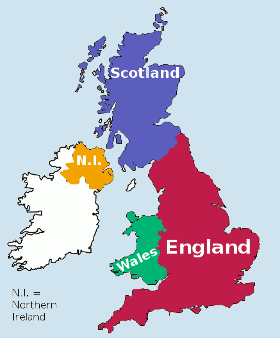
Les pronoms relatifs en anglais
Who, what, whose, which et les autres
- Pages d'accueil
- Vie et voyage
- Tourisme
- Pages étudiants
- Civilisation
Angleterre.org.uk - le guide : tourisme vie culture institutions
Who, which, that :
les
pronoms relatifs de base
Le plus souvent, les pronoms relatifs de base introduisent une proposition relative - soit comme sujet (who, which, that) , soit comme complément d'objet direct (whom, which, that), soit dans une expression prépositionnelle (to whom, with which, by which, etc).
| Antécédent | Pronom
sujet |
Pronom
objet |
Pronom
après préposition |
Adjectif
possessif |
| Animé. | who | whom* | (to, with, by...) whom | whose |
| Inanimé. | which | which | (to, with, by...) which | of which |
| Au choix | that | that |
whose |
* whom: Le pronom objet whom a tendance à disparaître en anglais contemporain, surtout à l'oral, et être remplacé par un simple who.
♣ Le pronom relatif possessif n'existe pas (sauf dans les questions) ; il faut utiliser l'adjectif posessif whose, qualifiant un substantif, ou la forme prépositionnelle. En d'autres termes, le mot whose ne se trouve jamais seul au début d'une proposition.
- This is the man who sold me a stolen mobile phone
- There were several people at the party, (whom) I'd never met before.
- There were a lot of people at the party, that I'd never met before
- The machine, which had been running non-stop for 36 hours, just stopped.
- The machine, that had been running non-stop for 36 hours, just stopped.
- I know the lady to whom you were talking
- I was in a very difficult situation, from which I could see no way out.
- The events that happened yesterday were rather alarming.
- After what happened yesterday, you ought to be more careful.
- The President,
whose wife
was a film star, was very popular.
What - pronom relatif nominal
What est utilisé comme "pronom relatif nominal" - c'est un relatif qui combine en un mot l'antécédent (réel ou implicite) et le pronom relatif. Autrement dit le mot what correspond au français ce que, et non au simple relative que.
- You'll have to manage with what you can find.
- What he said was rather interesting
- I can't understand why you did that. (= I can't understand the reason for which....)
- How you managed to pass your exam I can't imagine. (= I can't imagine the way in which...)
- I can't imagine how you managed to pass your exam
Whoever, whatever
Il existe d'autres formes de pronoms relatifs, à usage spécifique ou rare. Notez en particulier whoever et whatever etc., mots qui peuvent se comporter comme pronom personnel, ou comme pronom relatif nominal.
- Whoever heard such an absurd argument !
- Whoever lost the key ought to find it again pretty quickly.
- Whatever you
say, I'm not going to believe a
word of it.
(ou rarement...) Whatsoever you say, ..... - Whenever he goes to London, he gets lost.
- We'll give the prize to whoever gets the right answer first.
- You'll have to manage with whatever you can find.
Copyright Angleterre.org.uk. - Resources gratuites pour l'anglais..
Pages Grammaire - retour à la table des matières
Liens vers sites externes : Certains des liens externes sur les pages d'Angleterre.org.uk pointent vers des sites marchands sélectionnés. Pour la plupart des sites marchands Angleterre.org.uk adhère un un programme d'affiliation permettant de bénéficier d'une faible commission sur certains achats effectués par nos visiteurs. Cela est sans aucune incidence sur les prix de vente.




 Tout ce que
vous voulez y acheter, sans y aller
Tout ce que
vous voulez y acheter, sans y aller